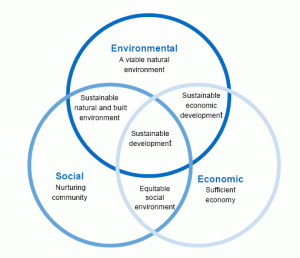 May 24 – Impact investing is a growing trend in the worldwide economic market. This relatively new concept, which first came to light in 2007 at a Rockefeller Foundation meeting, is the process of a company or individuals investing in other companies, funds or organizations to generate not only financial profit, but also social or environmental benefits. Such investments can be made through private equity, venture capital and other types of loans and bonds.
May 24 – Impact investing is a growing trend in the worldwide economic market. This relatively new concept, which first came to light in 2007 at a Rockefeller Foundation meeting, is the process of a company or individuals investing in other companies, funds or organizations to generate not only financial profit, but also social or environmental benefits. Such investments can be made through private equity, venture capital and other types of loans and bonds.
In 2012, around US$10 billion was invested worldwide through impact investing, and analysts such as the Monitor Institute and JP Morgan predict that this amount could reach up to an astounding US$500 billion per year by 2020. The growing importance of these types of investments has induced a powerful change in the business world since investors that focus specifically on philanthropy are now able to get more involved.
Tools such as Impact Reporting and Impact Investment Standards, created by the Global Impact Investing Network and the Social Return on Investment Network, are commonly used to help impact investors measure the potential input of the social and environmental progress of an organization.
The expectations of these new investors may complicate the structure of a private or public company looking for funds in a triple bottom line aimed organization. However, it could also be seen as a useful tool for companies looking to establish a real competitive advantage by way of improving their corporate social responsibility (CSR) image among current and prospective customers and partners. Furthermore, it could also be considered a way for companies to take the lead on upcoming global and local laws and regulations concerning environmental protection and social progress.
Although Asia is still quite an immature field for impact investments from other countries, it does offer good opportunities for local and foreign-invested companies to receive funds by way of impact investing from mainly European and American investors, especially since the continent is currently facing many environmental and social issues (e.g. pollution and poverty).
There are several challenges to overcome, such as cultural realities, weaknesses in civil society, social infrastructure and weak government support. However, despite the challenges that may remain, the Asian Development Bank predicts strong growth for impact investing in the region, especially in the education, sustainable agriculture, alternative energy and healthcare fields. Thus, impact investing is definitely a trend that foreign investors should keep an eye on in the upcoming years.
To learn more about impact investing:
The Impact Investing forum “Investing in Inclusion,” sponsored by Dezan Shira & Associates, is going to be held in Singapore on June 13-14. The forum aims to connect and bring together major decision makers from all critical parts of society (investors, policy-makers, private-sector actors, and enterprising innovators) at a single event to address the issue of Impact Investing in Asia. Bindu Lohani from the Asian Investment Bank, prestigious Nobel laureate Muhammad Yunus, and several other key speakers will be presenting at the event.
For more information about the forum, please visit: www.impactforum.asia/2013/



